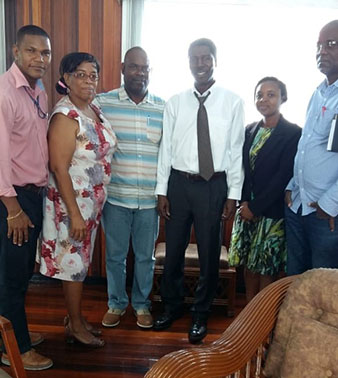Two more Guyana Geology and Mines Commission workers (GGMC) passed away last week, purportedly due to kidney failure and the Guyana Civil Servants and General Workers Union (GCS&GW) says it is awaiting further information on whether mercury poisoning contributed to their deaths.
A statement from the People’s Progressive Party (PPP) yesterday afternoon expressed concern over what it said were the untimely deaths of two more GGMC workers – Latchman Chiti, a surveyor in his late 40s and Clement Proffit, a lab technician, who was in his early 60s.
The two deaths bring the GGMC worker death toll to four, after Dwayne De Jonge, a ranger, and Leroy Greene, a carpenter, passed away earlier this year.
The statement said that the four deaths should be a cause for serious concern and it is disturbing that the government and the GGMC have been reluctant to inform the staff and public about actions taken to ensure the protection of not only the staff but also those in the surrounding communities.
For several months, there has been unrest at the GGMC Headquarters on Brickdam over the possibility that mercury fumes from the now removed Guyana Gold Board (GGB) lab could have led to poisoning of the GGMC staffers who have died. The lab was removed after several days of protests by workers. The families of the dead GGMC workers have not publicly made a case that their relatives died of mercury poisoning, The GGMC has also not addressed this issue and neither has the Ministry of Social Protection.
Representative of the GCS&GW Unata DeFreitas confirmed to Stabroek News last evening that both Chiti and Proffit passed away last week from what is suspected to be kidney failure. While there is no conclusive evidence to show that high levels of mercury in the men’s blood would have contributed to their deaths, DeFreitas said that they are awaiting the results of the post-mortem examination on Chiti to ascertain whether mercury levels contributed to his death.
She also explained that they have been in constant contact with the families of the four men and the Commission and will be investigating the matter further. She said the untimely deaths of the men have also reinforced calls to have proper and thorough certification of the GGMC headquarters and compound before any talk of normalcy returning.
“We are taking it very seriously but we are waiting on further information from the last death so that we can have some feedback,” she added.
A press release from the union last week had stated that it was seeking international assistance to determine whether the area is safe from mercury contamination and to determine whether a decontamination exercise was undertaken in accordance with internationally accepted standards and best practices.
As a result, the union requested meetings with international agencies and was able to meet with representatives of the Organisation of American States, the United Nations Development Programme, the Pan American Health Organisation, and the Embassy of the United States of America.
The release added that all the discussions were fruitful and the union was “very optimistic” that the matter will be treated with the utmost urgency.
The PPP statement yesterday also urged immediate action by the relevant authorities, including the management of the Commission and the Public Health Ministry to ensure that the required occupational health and safety standards are in place and the welfare of all staff and citizens is protected.
“The GGMC and the Ministry of Public Health must also operationalise all precautionary measures including testing and appropriate treatment of all staff, and persons in neighbouring communities who may have been exposed. This should be done at the cost of the GGMC,” the PPP added.
Earlier in the year, the Commission and the Guyana Gold Board admitted that there was a problem with mercury emissions. After mounting pressure from the workers, who boycotted work for several days, the Gold Board was forced to cease the burning of gold in the GGMC compound.
Over 200 workers were subsequently tested and according to the union they were found with varying levels of mercury in their blood and most of them were sent on sick leave.
Above normal levels of mercury can cause: mood swings, nervousness, irritability and other emotional changes, insomnia, headaches, abnormal sensations, muscle twitching, tremors, weakness, muscle atrophy and decreased cognitive functions. Further exposure to mercury can also cause kidney malfunction and respiratory failure, which can both result in death.
Though this has burgeoned into a major occupational safety and health matter, considering that deaths may be linked to mercury poisoning, the Occupational Safety and Health and Labour divisions of the Ministry of Social Protection have not issued public statements on any steps that have been taken to investigate and take action.






